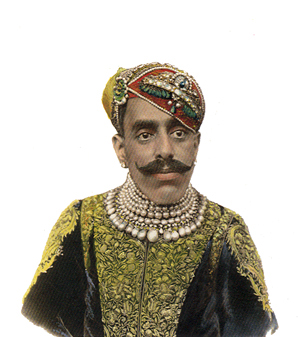Sitter: Major-General Maharajadhiraja Maharana Shri Sir Bhopal Singh Bahadur, Maharana of Udaipur Click on the image to see enlarged costume detail Image published in The Lafayette Studio
Image published in: Biog: Major-General H.H. Maharajadhiraja Maharana Shri Sir Bhopal Singh Bahadur, Maharana of Udaipur, GCSI (1.1.1931), KCIE (3.6.1919). b. at Udaipur, 24th February 1884, eldest son of H.H. Maharajadhiraja Maharana Shri Sir Fateh Singh Bahadur, Maharana of Udaipur, GCSI, GCIE, GCVO. Educ. privately. Succeeded in the death of his father, 24th May 1930. Signed the instrument of accession to the Dominion of India, 1947. Merged his state into the Rajasthan Union and was installed as Rajpramukh of Rajasthan 18th April 1948. Became Maharajpramukh of Rajasthan, 1st April 1949. Hon. Major-General, IA 15/10/1946 (Hon Lt-Col 4/8/1939), Hon Colonel Indian Grenadiers, 1/6/1954. Rcvd. Delhi Durbar (1911), Silver Jubilee (1935), Coronation (1937) and Indian Independence (1947) medals. Married
Date: c March 1933.(1) Occasion: - Location: Possibly Udaipur. Descr: FL seated. Costume: - Orders, Decorations & Medals: - Furniture & Props: -
Photographer: Possibly from an original portrait by Herzog & Higgins of Mhow-(2) Evidence of photographer at work: Note hand coloured image offered for sale at Bonham's October 2007 as "portrait by Herzog & Higgins of Mhow" is most probably from same photographic session. 
All images of sitter:
Copyright: V&A All images on this site are copyright V&A. For further information on using or requesting copies of any images please contact the V&A Picture Library: vaimages@vam.ac.uk including the URL of the relevant page Provenance: Pinewood Studios; acquired 1989.
References: Biog: Who's Who, The Times, 5 July 1955, p 13c; Brian Masters, Maharana; the Story of the Rulers of Udaipur, Ahmedabad, 1990. Occasion: - Costume: - Orders, Decorations & Medals: - Reproduced:
Acknowledgements: Christopher Buyers
1. Dated from negative sequence. 2. This negative is possibly a copy of an original made in India. |
|
All images are copyright V&A Museum, London |